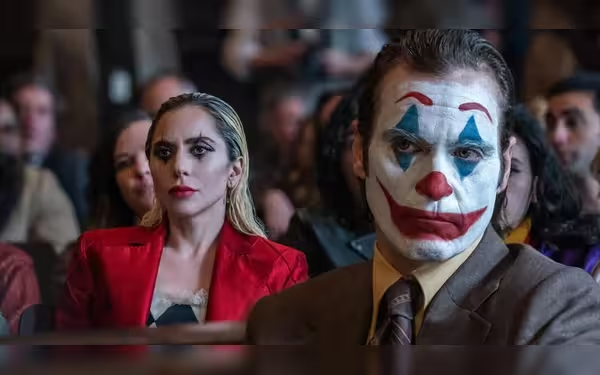Saturday, November 16, 2024 07:29 PM
Joaquin Phoenix Discusses Controversial Ending of Joker: Folie à Deux
- Joker's ending leaves fans feeling betrayed.
- Phoenix finds warmth in Arthur's tragic fate.
- Film offers a new perspective on villainy.
 Image Credits: mashable_me
Image Credits: mashable_meJoaquin Phoenix shares insights on the controversial ending of Joker: Folie à Deux, highlighting its emotional depth and connection to the DC universe.
The highly anticipated film, ‘Joker: Folie à Deux’, has stirred a whirlwind of emotions among its fans, particularly due to its unexpected and controversial ending. The film, which features Joaquin Phoenix reprising his role as Arthur Fleck, takes a bold turn that has left many viewers feeling unsettled. In a shocking climax, Arthur, who many believed would fully embrace his identity as the Joker, meets a tragic fate. Instead of becoming the infamous villain known for his chaotic antics in Gotham City, Arthur is brutally stabbed by an inmate in Arkham City Hospital, marking a significant departure from the traditional Joker narrative.
In a dramatic twist, the inmate not only attacks Arthur but also carves a Glasgow smile onto his face, reminiscent of Heath Ledger’s portrayal in ‘The Dark Knight’. This revelation suggests that the true Joker is not Arthur Fleck, but rather the inmate who is inspired by Arthur’s violent journey. This narrative choice has sparked outrage among comic book fans, many of whom feel cheated by the film’s portrayal of the Joker’s origin story. Instead of witnessing Arthur’s transformation into the Clown Prince of Crime, audiences are left with a sense of betrayal as they realize that the character they have followed throughout the film never truly becomes the Joker.
Despite the backlash, Joaquin Phoenix has expressed a different perspective on the film’s conclusion. In an interview with IGN, he described the final scene as having “a warmth” that resonates with him. He elaborated on the emotional depth of the moment, stating, “That’s all that I was thinking about, here’s this young man who’s telling me a joke and he’s nervous to tell me the joke. I can tell that he’s nervous, and I’m going to hear him out.” This insight reveals Phoenix’s appreciation for the character’s vulnerability, even in the face of tragedy.
Furthermore, Phoenix reflected on how the ending connects to the broader DC universe, suggesting that it serves as “a pretty good setup” for future narratives. This connection to Batman lore adds layers to the story, inviting viewers to consider the implications of Arthur’s journey and its impact on the Joker’s legacy.
While ‘Joker: Folie à Deux’ may have angered some fans with its unconventional ending, it also offers a fresh perspective on the character of Arthur Fleck. The film challenges traditional storytelling by presenting a narrative that diverges from expectations, prompting audiences to reflect on the complexities of identity and the nature of villainy. As viewers grapple with their feelings about the film, it becomes clear that the conversation surrounding the Joker is far from over, and the legacy of Arthur Fleck will continue to spark debate and discussion in the world of cinema.













